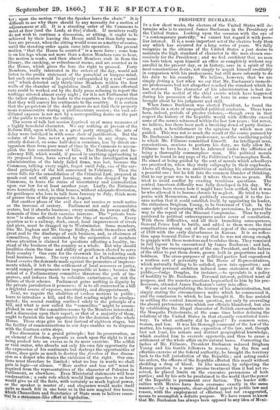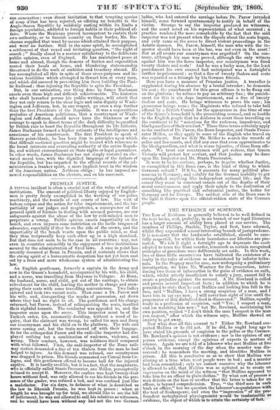PRESIDENT BUCHANAN. - Ix a few short weeks, the electors
of the United States will de- termine who is to succeed James Buchanan in the Presidency of the United States. Looking upon the occasion with the eye of "a contemporary posterity," we cannot but regard it with peou- liar interest. It is more important act of the elective body than any which has occurred for a long series of years. We fully recognize in the citizens of the United States a just desire to maintain the high standard of character in the men chosen suc- cessively for the Presidency ; and we feel confident that no man can have taken upon himself an office so completely without any parallel in the present day, or in history, save in a spirit of the most conscientious desire, not simply to acquit himself creditably in comparison with his predecessors, but still more solemnly to do his duty to his country. We believe, however, that we are simply stating a fact when we say that Mr. Buchanan's immedi- ate predecessors had not altogether reached the standard which he has restored. The character of his administration is best de- scribed in the recital of the chief events which have happened during his possession of the chair, or have in some cases been brought about by his judgment and skill. When James Buchanan was elected President, he found the Republic in a state of unequalled political confusion. There have been, indeed, periods of greater violence,—though even in that respect the history of the Republic would with difficulty exceed some of the scenes witnessed within the last few years ; but never, we believe, has there been such a breaking down of party distinc- tion, such a bewilderment in the opinions by which men are guided. This was not so much the result of the course pursued by Mr. Buchanan's immediate predecessor, as of the vacillating policy to which Mr. Fillmore committed himself. An intelligent man, conscientious, anxious to perform his duty, we fully allow Mr. Fillmore to have been ; but he laboured under the affliction of being a thoroughly commonplace man. His political morals might be found in any page of the Politician's Commonplace Book. He aimed at being guided by the sort of morals which schoolboys are practised in, when they study caligraphy in their copybooks. Above all things, he was ambitious of making his administration a peaceful one ; but he fell into the common blunder of thinking, that to say peace was to make it where there was no peace. He tried to avoid conflict by evading troubious questions. The central American difficulty was fully developed in his day. We have since been shown how it might have been settled, but it was he who allowed it to become chronic by neglect. He tried to tem- porize with Mormonism, and positively encouraged it to the in- sane notion that it could establish itself, by appointing its leader, the ridiculous Brigham Young, to be Governor of Utah. In the same spirit of temporizing with obsolete pretensions, he paved the way to the repeal of the Missouri Compromise. Thus he really pandered to political extravagances under cover of conciliation. With these difficulties, and all their branching consequences, General Peirce had to battle, and added to them were the first complications arising out of the actual repeal of the compromise of 1820 with the early disturbances in Kansas. It is no reflec- tion upon General Peirce if we say that he was not strong enough to grapple with these monsters and to subdue them. They remained in full vigour to be encountered by James Buchanan ; and had, indeed, by the encouragement of the one President, and the failure of the other to put them down, grown both in proportions and in boldness. The cross-purposes of political parties had engendered a restless sort of perversity in the House of Representatives, which naturally failing to be satisfied, grew into opposition ; and a peculiar personal ambition induced some statesmen of the re- public,—Judge Douglas, for instance,—to speculate in a policy of hostility to Mr. Buchanan. Personal interest, political want of purpose, and the monster questions bequeathed to him by his pre- decessors, attended James Ihichanan's entry into office. We are not recapitulating the history of his administration, but simply stating the circumstances under which he commenced it, and the conclusion to which he has brought it. He has assisted
in settling the central American question, not only by overruling the absurd pretensions into which our officials blundered, but also by establishing the illegal character of British encroachments in the Mosquito Protectorate, at the same time better defining the relations of the United States in that absurdly constituted terri- tory. To what authority did he appeal ? To common sense, reason, and law. It was his thorough command of the law of the matter, his temperate yet firm exposition of the law, and, though last not least, his minute and distinct geographical knowledge, which enabled him to overrule opponents, and thus to cause a settlement of the whole affair on its natural bases. Correcting the laches of Mr. Fillmore, President Buchanan reduced Brigham Young and his frantic followers to reason ; by the firm and effective exercise of the federal authority, he brought the territory back to the full jurisdiction of the Republic ; and acting under his orders, the officers of the Republic effected this result without shedding a drop of blood. In like manner, by subjecting the Kansas question to a more precise treatment than it had yet re- ceived, he placed limits on the excessive pretensions of both parties ; and by his acts he proclaimed to the world that the power of the Republic is paramount over faction. The border diffi- culties with Mexico have been overcome exactly in. the same manner,—by a temperate, clear-sighted appeal to public law and reason, with the employment of effectual, but not exaggerated, ' means to accomplish a definite purpose. We have reason to know
i
that Mr. Buchanan has always been opposed to any idea of Neu- oan annexation ; even direct invitation to that tempting species of coup d'etat has been rejected, as offering no benefits to the Anglo-Saxon Republic by -suddenly casting within its limits a foreign population, addieted to foreign habits in their political af- fairs. Where the Mexicans proved incompetent to sustain their own authority, or to furnish security on their border, Mr. Bu- chanan supplied that want by means which attained their purpose, and went no further. Still in the same spirit, he accomplished a settlement of that vexed and irritating question, " the right of search ; " finally closed in a manner satisfactory to the deliberate public opinion, even of England. He has maintained peace at home and abroad, though the demons of faction and superstition reared their heads at home, and blundering statesmanship threatened to do the work of ambition and treachery abroad. He has accomplished all this in spite of those cross-purposes and in- vidious hostilities which attempted to thwart him at every turn, and which did succeed in preventing him from building the Paci- fic Railroad ; thus injuring the Republic to spite the President.
But, in our estimation, one thing done by James Buchanan excels even these high and difficult achievements. The historian who shall hereafter peruse bin public writings, will admit that they not only return to the clear logic and calm dignity of Wash- ington and Jefferson, but, in one respect, go even a step further than the first Presidents of the Republic. It was a superstitious prejudice of American politicians, that a countryman of Wash- ington and Jefferson should never have the frankness or the courage to speak in direct terms of the dark difficulty bequeathed by British rule to beset the Republic throughout its life hitherto. James Buchanan formed a higher estimate of the intelligence and conscience of his countrymen. The first President to speak of Slavery point-blank, he has been firm to principles upon which that difficult sectional question might be treated with reference to the broad interests and overruling authority of the entire Repub- lic, and without encroachment on State rights or legal guarantees. In other words, James Buchanan has not simply restored an ele- vated moral tone, with the dignified language of the fathers of the Republic, but has imparted to the official records of the ad- ministration a franker spirit, a more implicit trust in the wisdom of the American nation. Noblesse oblige : he has imposed re- newed responsibilities on the electors, and on his successor.



























 Previous page
Previous page